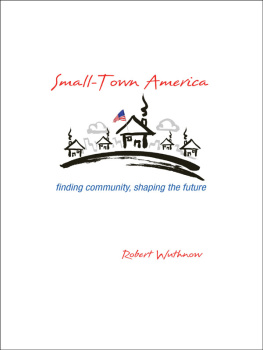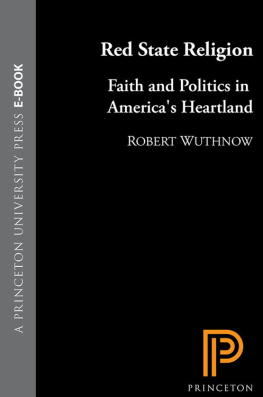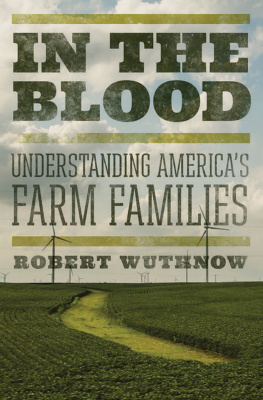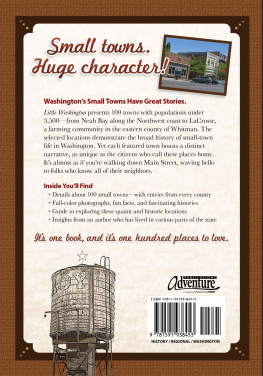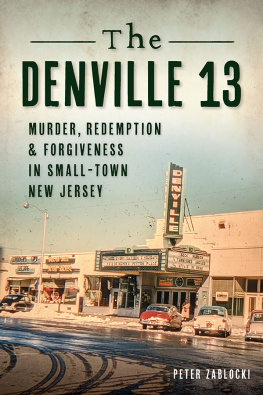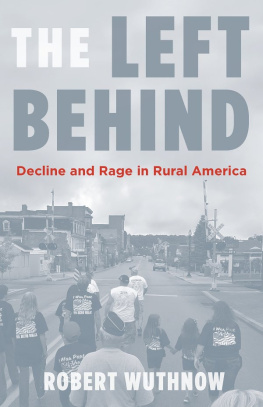
Small-Town America
Small-Town America

Finding Community, Shaping the Future
Robert Wuthnow
PRINCETON UNIVERSITY PRESS
PRINCETON AND OXFORD
Copyright 2013 by Princeton University Press
Published by Princeton University Press, 41 William Street, Princeton, New Jersey 08540
In the United Kingdom: Princeton University Press, 6 Oxford Street, Woodstock, Oxfordshire OX20 1TW
press.princeton.edu
All Rights Reserved
Library of Congress Cataloging-in-Publication Data
Wuthnow, Robert.
Small-town America : finding community, shaping the future / Robert Wuthnow.
pages cm
Includes bibliographical references and index.
ISBN 978-0-691-15720-7 (hbk. : alk. paper) 1. Cities and townsUnited States.
2. CommunitiesUnited States. I. Title.
HT123.W88 2013
307.760973dc23
2012042793
British Library Cataloging-in-Publication Data is available
This book has been composed in Sabon with Erazure for display
Printed on acid-free paper. 
Printed in the United States of America
1 3 5 7 9 10 8 6 4 2
CONTENTS
LIST OF FIGURES
LIST OF PROFILES
PREFACE
I LIVE IN A SMALL TOWN. The population of my community is approximately 4,200, just slightly more than it was twenty-five years ago. The three-block expanse that passes for Main Street is home to a post office, bagel shop, pizza parlor, pet grooming salon, and a couple other vital establishments, all neatly sandwiched between branch office banks at either end, and facing an old Presbyterian church and a private school with its own golf course on the opposite side. At the end of my block, there is a five-acre field that the farmer double crops year after year while the depleted soil waits to become a housing development. Across the road is an old farmstead that has been there for more than a century, and is now accompanied by a large machine shed and three shiny grain storage tanks. Around the corner is a farm with a big green barn that a Polish family used for three generations to feed cows and chickens. One cold rainy day, I stood ankle deep in mud while an auctioneer sold off the remaining machinery. Now the farm is an upscale organic food cooperative.
While most of us who live here would call our community a small town, in reality it is not. In every direction its edges blend imperceptibly with adjacent municipalities that are larger. More than 35,000 people live in the township and nearly 370,000 live in the countywhich has grown by about 10 percent per decade for the past century. More than 1 million people live in a twenty-mile radius, and more than 10 million live within fifty miles. On Election Day, I usually see a neighbor or two as we stand in line at the fire station, but otherwise it is rare to identify a familiar face. Although a serious effort has been made to preserve an occasional farm and keep some space open for parks, nearly everything in sight has been turned into housing developments and highways. For two hours every morning and evening, these arteries are clogged with cars and trucks.
My community is not the kind of small town this book is about. Lots of people like me live in communities that we may think of as small towns, but these are in reality municipal subdivisions of large metropolitan areas. They are not the kind of small towns that have retained autonomy from larger places and have a distinctive identity. A better example of these communities is the town in which I was raised. Thirty-five hundred people live in the community, about a thousand fewer than when I grew up there in the 1950s. As the county seat, it is the largest town in the county, which totals just over 10,000 residents. The nearest city of any size is sixty-five miles away. Nearly everyone works locally, tending the forty-odd small shops that huddle around the town square, working at one of the towns two small manufacturing firms, or farming the open land that surrounds the town on all sides. Settled a century and a half ago, it is still a part of rural America, but it has adapted as well. A large consolidated high school sits on one edge of town, and a new hospital has recently been constructed a few blocks away. There is a new ethanol plant several miles in one direction from town, and a large wind energy farm in another.
Living as I currently do in a large metropolitan area, I find that the fellow residents I talk to and newspapers that land in my driveway offer ill-informed opinions about the lifestyles and attitudes of people who live in small towns. Without too much simplification, these perceptions can be placed into one of two categories. The first consists of ah, wouldnt it be nice perceptionsas in, wouldnt it be nice to get up in the morning and sit lazily on the veranda listening to the birds singing, and then wander a few blocks down to the post office, chatting with some neighbors along the way. Or, wouldnt it be nice to live like people used to when nobody locked their doors, the air was fresh, morals were pure, and life was uncomplicated. These are the sentiments that easily spring unbidden to mind after commuting through rush-hour traffic from a harried day at the office. They spark the imagination as we read of rustic weekend getaways and contemplate the possibility of escaping there permanently. The other category takes nearly the opposite stance. Small towns, in this view, are the sorry remnant of an America that has been left behind, passed over by the inevitable march of urban progress. The enterprising populace lives in cities and suburbs. Small towns are the refuge of hapless, poorly educated Americans who have little better to do than watch the grass grow.
It is difficult to write about small towns without falling victim to such expressions of nostalgia or mild disdain. Pundits visit small towns looking for homespun wisdom and old-fashioned values. These are the places, they believe, to find colorful old-timers who chew on a cornstalk and tell tales of the good old days. Others imagine dull communities devoid of entertainment and lacking in cultural sophistication. Surely this is where ignorance and bigotry reside.
Another view of small towns recently seems to have become even more common. This is the notion, to put it bluntly, that information about small towns should serve chiefly for the entertainment of people who live in cities and suburbs. From this perspective, a memoir written by someone in a small town should be rich with humorous anecdotes. A reader should expect to chuckle at events that could happen only among folks in some remote setting. A novel set in a small town should titillate readers with a murder or two, sexual escapades, dark secrets, and revelations of hypocrisy. A mental escape to a small town should thus be the twenty-first-century equivalent of an earlier urban bourgeoisie attending a minstrel show or amusing themselves with an occasional visit to the slums. It would be a shock to learn that people in small towns are pretty much like other Americans, or that residents are complicated, reflective persons who spend time making sense of their lives and relate to their communities in complex ways.
This book provides an account of how the residents of Americas small towns find community, what it means to them, and why it is important. The evidence comes from hundreds of in-depth qualitative interviews with residents in dozens of small towns across the country. We hear from people like Bud Janssen, a resident of a small town on the high plains who spends his days farming more than fifteen-square miles of rich cropland, and Larry Yeager, a crew chief who, like a surprising number of small-town residents, earns a comfortable living for his young family at a small manufacturing plant. We meet Dorothy Martin, a widow who supplements her monthly Social Security checks running a five-and-dime store in a riverfront town of nine hundred, and Maria Sanchez, a daughter of migrant farm laborers who tutors children of recent immigrants. The diversity that characterizes small-town America comes into focus as Mato Tanka describes his Lakota heritage, Mary Remmert discusses the effects of mining closures on her community, and Clarence Brown recalls the struggles in his town to combat racial discrimination.
Next page
